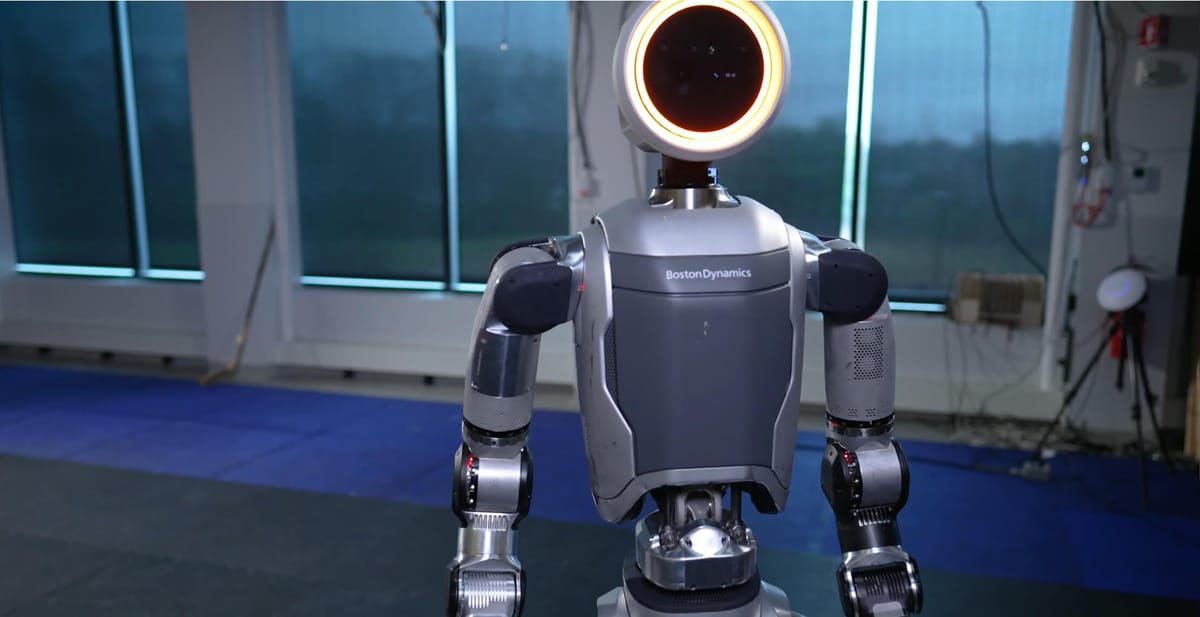
To say that the robotics world just witnessed a significant leap forward with the unveiling of Boston Dynamics' new all-electric Atlas robot would not be an understatement. This announcement comes just a day after the retirement of its hydraulic predecessor and marks a new chapter in the company's journey toward commercial humanoid robots.
Take 40 seconds and watch this 👀
The new Atlas ditches the hydraulic design of its predessor, and boasts a broader range of motion and increased strength. The electric version is also designed to be stronger and more agile, exceeding human capabilities while maintaining a human-like form factor. This approach allows the robot to navigate environments designed for people while performing tasks with enhanced efficiency.
Robert Playter, CEO of Boston Dynamics, emphasized the company's patient and imaginative approach to commercialization, ensuring that Atlas is not just an impressive R&D project but a valuable solution. The collaboration with Hyundai, both as an investor and a testing ground for Atlas applications, underscores Boston Dynamics' commitment to understanding use cases and delivering sufficient productivity to make robot investment worthwhile.
I can't stress enough how impressive the new sleek, streamlined design and capabilities of the Atlas are. It immediately stands out from its predecessors and other leading humanoid robots like Figure 01. Gone are the exposed cables and bulky torso, replaced by a svelte mechanical skeleton and a softer, more approachable aesthetic. The robot's head features a large, circular display reminiscent of a traffic light, which Playter says is intended to convey friendliness and openness.
One of the most striking aspects of the electric Atlas is its enhanced mobility. The teaser video of the new Atlas showcases its uncanny yet impressive movements, including a clever leg rotation that allows it to switch positions effortlessly. The robot's head and torso can spin 180 degrees, and its gait, though still a bit jerky, exudes a confident fluidity.
Boston Dynamics also highlights the importance of general-purpose humanoids, moving beyond single-task robots. Atlas is designed to support a wide range of tasks, leveraging its two hands to handle complex and heavy objects that simpler robots cannot manage. The company's experience with dynamic mobility and heavy payload accommodation further sets Atlas apart, showcasing its ability to pick up heavy, complex objects with ease.
Boston Dynamics plans to collaborate with Hyundai, its parent company, to test and iterate Atlas applications in real-world settings over the coming years. "We're going to be doing experiments with Hyundai on-site, beginning next year," Playter revealed. "To make this successful, you have to have a lot more than just cool tech. You really have to understand that use case, you've got to have sufficient productivity to make investment in a robot worthwhile"
Boston Dynamics also emphasized the importance of delivering a complete ecosystem of software, services, and support alongside the robot to ensure its usefulness in practical applications. The introduction of their Orbit™ software platform is a key part of their strategy to integrate these robots into larger digital ecosystems. This platform will manage the robots' operations and help in creating digital twins of facilities to optimize their functionality. Of course, the company is no stranger to this as it has already successfully deployed Spot and Stretch in various industries.
The all-electric Atlas represents a significant milestone in the evolution of humanoid robots, combining dynamic mobility, advanced manipulation, and intelligent software to push the boundaries of what machines can achieve. Boston Dynamics has once again raised the bar, setting the stage for a future where humanoids seamlessly integrate into our lives, revolutionizing how we work and live.

